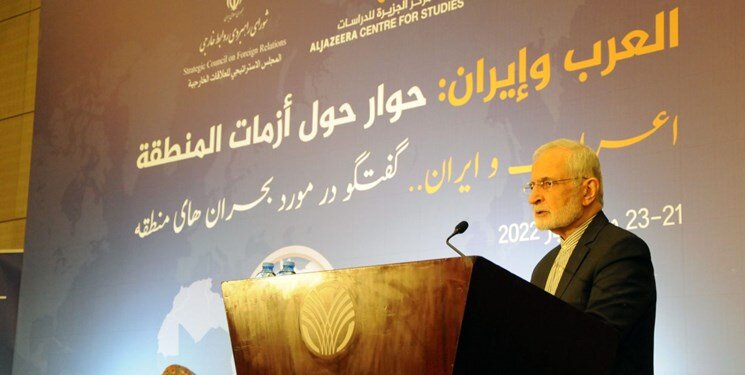TEHRAN- The continued presence of the U.S. and Israel in the Persian Gulf region will threaten the future of the region, says head of Iran’s Strategic Council on Foreign Relations (SCFR) Kamal Kharrazi.
Kharrazi made the statements on Saturday evening at the second session of the Arab-Iran dialogue in Doha.
“My proposal to the leaders of the region is to move towards a strong region and the first step in this direction, which has fortunately begun, is to resolve differences through dialogue,” Kharrazi highlighted.
Kharrazi, who was Iran’s foreign minister from 1997 to 2005, also expressed delight over the deal between Saudi Arabia and Iran to resume bilateral ties.
The Iranian official regarded the visit of the Sultan of Oman to Tehran as evidence of the expanding links between Iran and the countries of the Persian Gulf region, citing the strengthening of ties between Iran and Arab nations such the UAE, Kuwait, Oman, Qatar, and Iraq.
Given the recent international developments moving toward multipolarity, Kharrazi said that the regional leaders had displayed their intelligence by enacting an independent strategy.
“These developments are a sign of the maturity and intelligence of the regional countries in utilizing recent international developments for the benefit of their country and the region,” he continued.
In other part of his remarks, Kharrazi stated that the achievement of common interests necessitates honest but candid communication, collaboration in economic, scientific, and cultural spheres, moderation, and the decision to build a regional collective security mechanism without the participation of foreigners.
He stated that “security” and “development” are intertwined ideas.
Kharrazi emphasized Iran’s position on the security of the Persian Gulf, stating Iran views the security of the Persian Gulf as one of its main concerns, along with the developments in Yemen, and the Palestine issue.
“Iran views security in the Persian Gulf and in each of its nations as part of its own security,” he said, adding, “We oppose the presence of foreign forces since their presence is the root of the instability in the region.”
He went on to add, “The existence of the United States and the Israeli apartheid regime in the Persian Gulf region not only failed to provide security, but also will create a perilous future for the region.”
The veteran politician underscored the significance of the Palestinian issue for the Muslim world and decisively denounced the Zionists’ atrocities against the Palestinians while welcoming the recent events in Yemen as well as the restoration of ties between Syria and other fellow Arab nations.
“Resistance is the only way to confront the atrocities of the Israeli apartheid regime and safeguard the rights of Palestinians,” he noted.
He came to the conclusion that the only way to resolve the Palestinian issue is for all original inhabitants, including refugees, whether they are Muslims, Christians, or Jews, to vote in a referendum to establish their own single political system.
Leading a delegation of former Iranian officials who are associated with Iran’s Arab policies, Kharrazi visited Doha on Saturday to attend a conference of Iran-Arab relations.
He delivered opening remarks at the Arab-Iran Dialogue, which is organized jointly by the SCFR and Al Jazeera Center for Studies.
The gathering comes at a time when Iran and Arab countries are moving toward reconciliation after about seven years of estrangement.
Iran and Saudi Arabia have recently named their ambassadors after deciding to resume their diplomatic relations. Alireza Enayati has reportedly been named as Iran’s new ambassador to Riyadh.
Enayati, head of the Persian Gulf Bureau at the Iranian Foreign Ministry, was involved in the Chinese-brokered deal that restored diplomatic relations between Iran and Saudi Arabia. The deal, reached on March 10, stipulated that Tehran and Riyadh reopen their embassies within a period of two months.


No comments:
Post a Comment